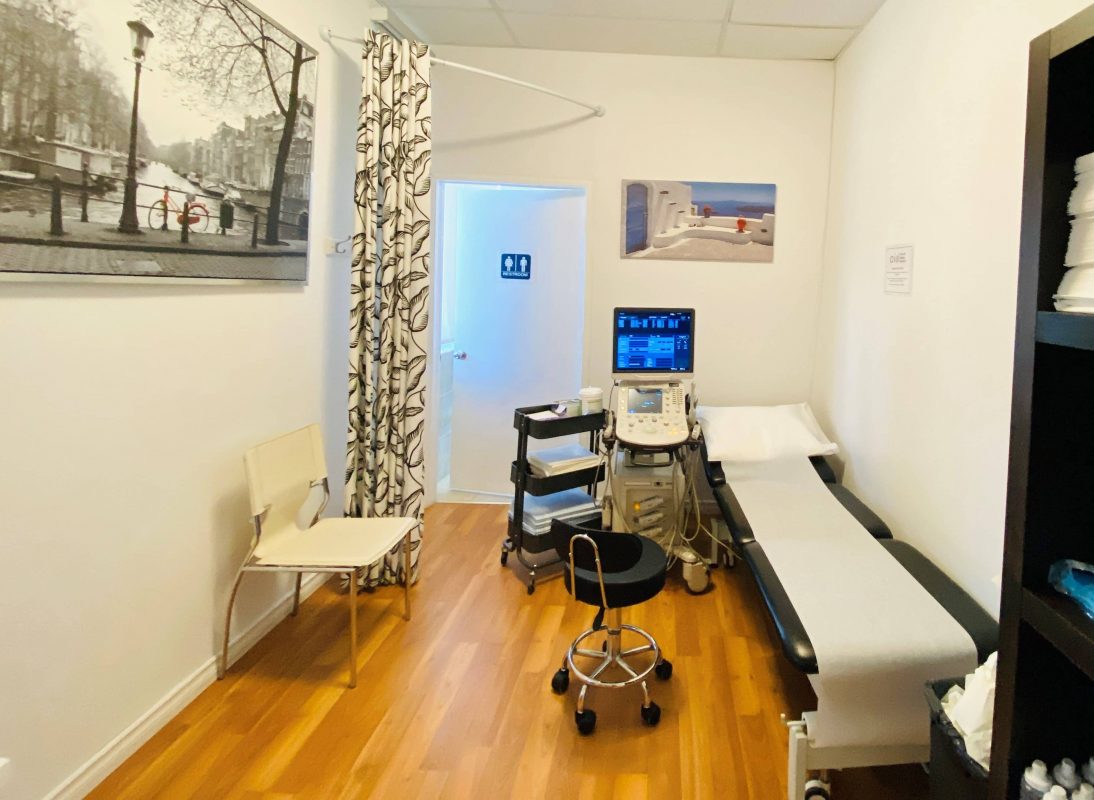An ultrasound is a method of diagnostic imaging that uses sound waves to capture real-time images of a patient’s organs, vessels, and/or tissues.
These images provide important information in diagnosing and treating various health conditions.
Ultrasound imaging is a safe and effective imaging method that uses no radiation and has no known risks.
What are ultrasounds commonly used for?
1.- Monitoring a women’s uterus and ovaries during pregnancy
2.- Monitoring the baby’s health while in utero
3.- Diagnosing gallbladder disease
4.- Assessing joint inflammation
5.- Evaluating blood flow
6.- Examining breast lumps
7.- Checking your thyroid gland

TYPES OF ULTRASOUND SERVICES WE OFFER:
– General
– Obstetrical
– Musculoskeletal
– Small Parts
WHAT TO EXPECT FROM THE ULTRASOUND SCAN
- You will be asked to lay on a table and expose the area of your body that is to be examined.
- The ultrasound technician will then apply a lubricated gel to your skin and use an ultrasound probe to capture a real-time image of the organ or tissue being assessed.
- Depending on the area being examined, you may be asked to change positions in order to give the technician the best view or a different view.
- Ultrasounds are generally painless, but some may experience discomfort depending on the area being examined.
- Most ultrasounds last between 30min to an hour, depending on the area being examined.
- Once your ultrasound is complete, your ultrasound technician will send your results to the referring physician.
*Due to the ongoing pandemic, visitors are not allowed to accompany patients inside the clinic. As per the Ministry of Health, partners cannot be present for OBS ultrasounds. We can provide pictures, CDs and the option to FaceTime during the appointment.
DO I NEED TO MAKE AN APPOINMENT FOR AN ULTRASOUND?
Patients must have a referral from a physician to schedule an appointment.
Please keep in mind any specific ultrasound preparations when scheduling a date and time. We cannot accommodate walk-ins for ultrasounds, please call to book your appointment.
HOW TO PREPARE
* Please arrive 5 minutes before your scheduled appointment time to register and ask any questions you may have.
*Please bring your health card and referral form with you.
We recommend wearing loose, comfortable clothing to maximize comfort and ease of access.
You may be asked to wear a gown, depending on the type of ultrasound you are having. Please avoid wearing jewelry to your appointment.
General preparation guidelines for specific ultrasound services:
1. Abdominal
- Fast for 12 hours prior to test and fat free diet for 24 hours before.
- Nothing (but water) by mouth until examination.
- Please continue to take your medication(s) as prescribed (it is ok to swallow medication with water).
2. Pelvis (male or female) US / Bladder US:
- Patient must drink 1 liter of water 1 hour and 15 minutes prior to appointment time, finish drinking within 15 minutes, and hold.
- Do not empty your bladder until the Technologist advises you.
- Patient may eat; fasting is not required.
3. Renal/Kidney US:
- Patient must drink 2 full glasses of water (15oz.) 30 minutes prior to the examination.
- Do not empty your bladder until the Technologist advises you.
4. Prostate (transrectal):
- Patient has to take 2 Dulcolax tablets night before.
- Clear the bowel in the morning.
- Drink 1 liter of clear fluid /water 1hour and 15 minutes prior to appointment time, finish drinking within 15 minutes, and hold.
- Do not empty your bladder until the Technologist advises you.
- Produces images of a man’s prostate gland and surrounding tissue.
- The exam requires insertion of an ultrasound probe into the rectum of the patient. The testis safe and painless.
5. Obstetrical US:
- All types of Obstetrical US tests require full bladder (!) 1st and beginning of 2nd trimester patients (Dating and Nuchal Translucency) need to drink 1 liter of clear fluid 1hour prior to appointment time, finish drinking within 15 minutes, and hold.
- Do not empty your bladder until the Technologist advises you.
- In later stages of pregnancy the amount of the fluid and the waiting time could be reduced, but the patient must come for the test with a full bladder.
- Patient may eat; fasting is not required.
6. Musculoskeletal US:
- For patients who had cortisone shots in the examined area advised to wait at least 7 days before having US exam.
- No preparation is required in other cases.
No preparation is required for the following procedures:
-
Musculoskeletal ultrasound – No preparation required but no joint injections should be performed 7 days before your ultrasound appointment
-
Thyroid ultrasound
-
Breast ultrasound
-
Soft tissue
-
Groin/Hernia
-
Scrotum
-
Axilla
-
Abdominal wall
-
Parotid glands
-
Neck
